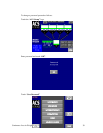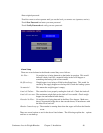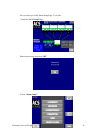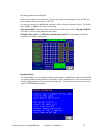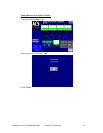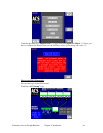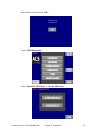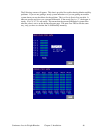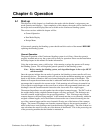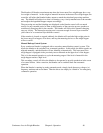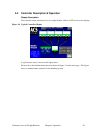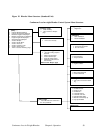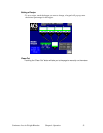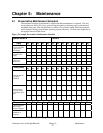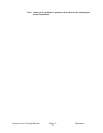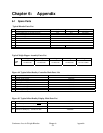
Continuous Loss-in-Weight Blenders Chapter 4: Operation 47
Chapter 4: Operation
4-1 Start-up
The objective of this chapter is to familiarize the reader with the blender’s recipe menu, run
mode operation and displays. Upon completion of this chapter, the reader will be familiar with
the recipe and run mode displays that are available on the continuous blending system.
The various sections within this chapter will be:
• General Operation
• Run Mode Display
• Recipe Menu
All personnel operating the blending system should read this section of the manual BEFORE
operating the blending system.
General Operation
The general operation of the Continuous blending system is as follows: Once the system is
properly installed and set up, the system will be ready for operation. Please see the Installation
and Setup chapter in this manual for further information.
Using the recipe menu, enter a valid recipe. After entering a recipe, the operator will startup
the blending system. This will begin the general operation of the blending system.
Note: Before starting the blending system, each ingredient hopper in the recipe MUST
contain material.
Once the operator initiates the run mode of operation, the blending system controller will start
the metering devices. The metering units will start out at the maximum metering rate at speeds
based on the feeder calibrations that were learned during the prior setup of the blender. The
blender will output the maximum rate that is achievable with the feeder sizes, and the recipe
percentage that is entered in the current recipe. Each metering unit will meter its material out
of its respective weigh hopper at the correct rate to achieve the programmed blend ratio, and
discharge it into the cascade material chute above the lower mass flow weigh hopper.
The metered ingredients cascade together into the weighed common hopper. The PLC looks at
the weight change in the weighed common hopper over time, and learns “The discharge rate
from the common weigh hopper to the processing machine.” This “Discharge rate from the
common hopper to the processing machine” is the learned rate that occurs internally within the
weighed common hopper, and is the difference between the rate of material entering into the
top of the common hopper and the rate of material flowing out of the bottom of the common
hopper. The learned “Discharge rate from the common hopper to the processing machine”, is
added to the known total discharge rate from the blender weigh hoppers. The sum of these two
rates calculates the actual flow rate out of the bottom of the blender. This is the processing rate
of the processing machine that the blender is mounted on.



